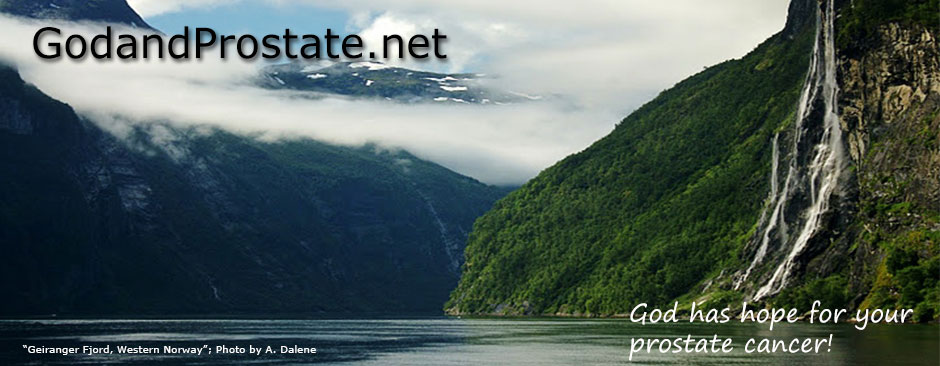
Why this website? Based on rates from 2004-2006, 15.9% of men born today (one out of every six men) will be diagnosed with cancer of the prostate at some time during their lifetime. In 2009, it is estimated that 192,280 men will be diagnosed with and 27,360 men will die of prostate cancer according to the National Cancer Institute (NCI).
A few years ago, my urology surgeon asked me to review a book written by a prostate cancer patient in which the author described his personal experiences and spiritual beliefs as they related to his disease. Upon reporting back about the book, my surgeon asked if I had kept a diary of my own cancer journey and if so, he suggested that I write such a book myself. Since books have endings, and since my story is on-going, I decided to share my experiences as a website. I will endeavor to tell my story in chronological order starting with my diagnosis in 1995. I will include medical references, Biblical references (which I will call “spiritual medicines”) and a summary of lessons I have learned or am learning. There are also recurring themes which God seems to bring to my attention either from His Word (the Bible), from several devotional books or other sources. My hope is that the information and principles expressed herein will be used by any man in any condition since we all share similar physical bodies and spiritual natures.
Under what conditions do we learn the most valuable lessons in life? Do we learn best when everything is going smoothly? No! Life’s most important lessons are learned when we encounter adversity and life’s storms. For all of us, disease is part of life. We all have to die of one cause or another. Life does not end with prostate cancer. From a purely physical point of view, our earthly bodies are mortal; they are designed to eventually break down and die. God has indeed numbered our days. As evidence for this, chromosome endings in our genes contain DNA sequences called telomeres which are copied every time a cell divides. Telomeres shorten with the age of a cell; thus their shortening contributes to the aging process. Their length is a marker of biological aging. Normal cells can only divide a certain number of times. On the other hand cancer cells have longer telomeres which give them a sinister form of immortality. But are we only physical beings? Are there not psychological and especially spiritual issues which are even more important than just the physical part of life? All of us are eternal physical and spiritual beings. We do not cease to exist if a disease such as prostate cancer takes our lives.
Hopefully, this website shares important lessons that I could not have learned under any other condition. God has a purpose for everything even prostate cancer. Jesus and His disciples once encountered a man who had been blind from birth. His disciples asked Jesus why the man had been born blind to which Jesus answered that “it was in order that the works of God might be displayed in him” (John 9:3). And so it can be with prostate cancer. God wants to display His love, power and glory through those who know Him even if we have to endure prostate cancer. Jesus wants His divine and perfect nature to be seen in us even if we are imperfect men. He desires that we learn how to trust God and to trust in Him alone, although God often uses medical experts and physicians to achieve His results. God wants to increase (perfect or mature) our faith to new levels and teach us to depend solely upon Him whether we see physical evidences, signs or not. God also desires that we see our lives as eternal and that through our faith in Christ, we are to live forever in a new heaven and a new earth with new perfected, disease-free bodies. Experiencing prostate cancer can produce this eternal perspective within us.
This website will also address healing of diseases, either by medical or pharmaceutical means or by God’s direct intervention. Miracles still happen today just as they did in Jesus’ time. Specific examples of people being healed of cancer may be included. God uses four options in healing: gradually, temporarily, suddenly and permanently. Healing can involve an instantaneous change, keeping a situation under control (chronic) and eventually death can be seen as the ultimate healing for those who know God and whose destination is heaven. Healing is not just a “one shot deal”; it can also be a process which God uses for His purposes and lessons. Rabbi Harold Kushner, author of “When Bad Things Happen to Good People”, defines miracles as “something unusual that happens when it need not have happened and by happening sustains people’s faith in God and the world.” But even if a miracle doesn’t happen, we can still experience ‘miraculous” things. Even the absence of a miracle can be positive and life-affirming when we can say “Lord, not my will but Thine be done” (Mark 14:36) or as Job stated, “the Lord gave and the Lord has taken away. Blessed be the name of the Lord”, (Job 1:21).